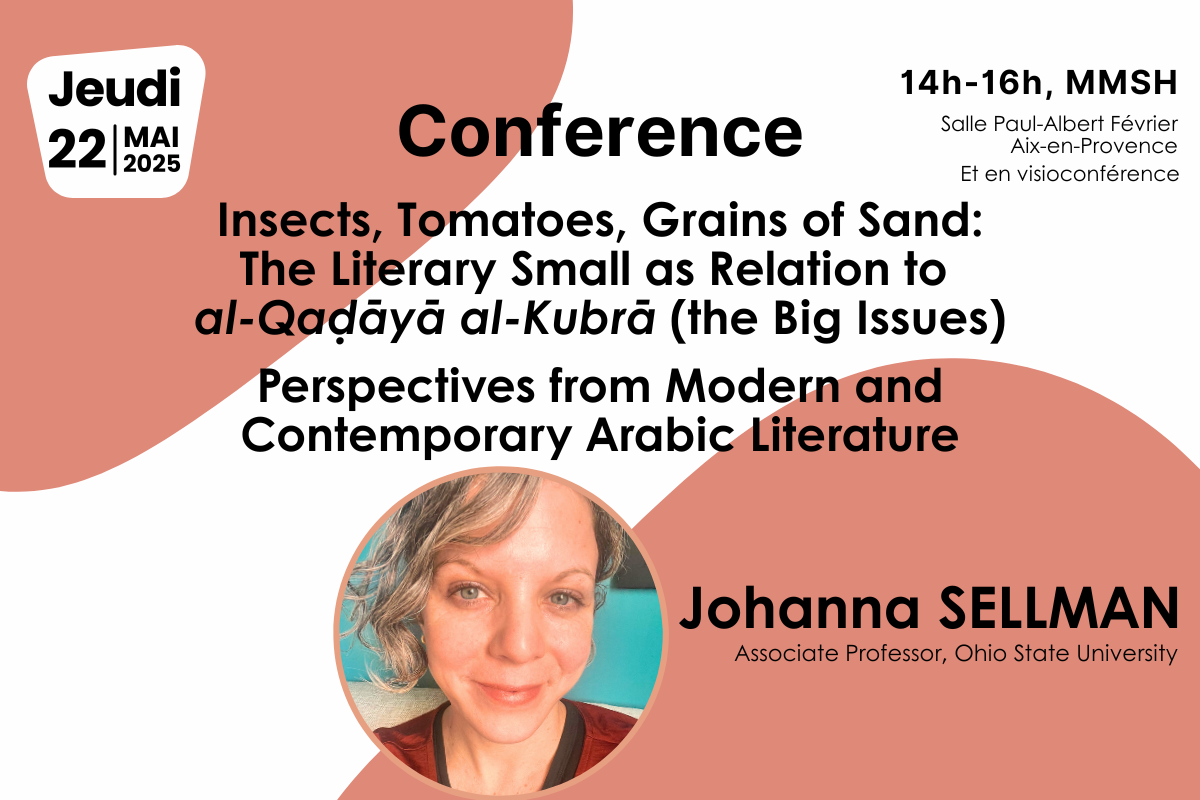
Conference "Insects, Tomatoes, Grains of Sand: The Literary Small as Relation to al-Qaḍāyā al-Kubrā (the Big Issues)"
Perspectives from Modern and Contemporary Arabic Literature - Johanna SELLMAN (Ohio State University)
Jeudi 22 mai 2025, 14h-16h, MMSH, salle Paul-Albert Février, Aix-en-Provence et en visioconférence : lien Zoom / ID : 945 7690 2888 / Passcode : 362168
Organisée par Annamaria BIANCO, chercheure associée à l'IREMAM dans le cadre des activités du Pôle Langues, littérature, linguistique du laboratoire.
This talk takes its cue from a group of author-critics who theorize the importance of the “small” in contemporary and modern Arabic literature. For example, Alexandra Shraytekh locates “the miniscule, the seemingly insignificant, the fragmentary” (Shraytekh) as a recurring ecopolitical concern of survival in contemporary Palestinian cultural production. Adania Shibli has made the small and the “detail” central to a literary project of ethical witnessing in Palestine. Hoda Barakat’s theorization of world literature posits that any claims of universality in literature must be grounded in the small, local, and particular. Here, I ask: What narrative openings are made possible by centering seemingly small-scale actors such as bees, spiders, butterflies, and vegetables? Together, we will query how several contemporary Arab authors and their texts posit the small and the minor as portals to contemporary questions of overwhelming magnitude, such as borders, genocides, and mass displacement. While some critics have lamented the fading away of al-Qaḍāyā al-kubrā, or the big social issues, as a guiding principle in contemporary Arabic literature, seeing this as an abandonment of commitment to just causes, I offer an alternative perspective: a theorization of literature as a space of attuning to leaps in scale, the unknowable relationship between the small and the large (the “butterfly effect”), and the navigation of proximity and distance. I suggest a re-visiting of the place of wonder and the sublime in contemporary Arabic literature, where an anchoring in the small and the minor creates the possibility for an encounter with what is overwhelming or ungraspable—an encounter that nonetheless remains relational. I turn to feminist theorizations of a “countersublime” that recuperate the very interrelatedness and embodiment that dominant traditions of the sublime have been invested in overcoming. In dialogue with theorists such as Lisa Marchi who argues for a “bifocal” attention (both micro- and macroscopic) in reading diasporic Arab women’s poetry and Samina Najmi who identifies forms of the sublime that cultivate global connectedness, I share specific moments from contemporary Arabic literary texts where the small invites us into ethical relation with each other and to what might be experienced as overwhelming. Rather than see this shift as an abandonment of engagement with serious social issues, I argue that it represents a vital renegotiation. These moments illuminate one of the many ways that literature creates space beyond our habitual guardrails and frames for meaning, thus creating conditions for learning and unlearning.
Johanna SELLMAN is Associate Professor in the Department of Near Eastern and South Asian Languages and Cultures at The Ohio State University. A scholar of Arabic and comparative literature, her research interests include modern and contemporary Arabic, francophone, and Scandinavian literatures, migration and postmigration studies, translation, gender and sexuality studies, and ecocriticism. Her book Arabic Exile Literature in Europe: Defamiliarizing Forced Migration (2022) traces the emergence of a post-1990s Arabic literature of forced migration in Europe and its sustained yet multifaceted engagement with questions of borders, and exile writing. Her articles have appeared in journals such as Journal of Arabic Literature, Journal of Postcolonial Writing, Karavan, Banipal, and Theatre Research International. Johanna is currently co-editor of Comicalités special issue “Comics and Ecopolitics” and the European Association for Modern Arabic Literature’s conference proceedings, Ecocriticism in Modern Arabic Literature, and a member of the 2024-25 cohort of GAHDT faculty fellows working on writing linked to her project, “Narratives of Care Across Borders in Contemporary Arabic Literature.”